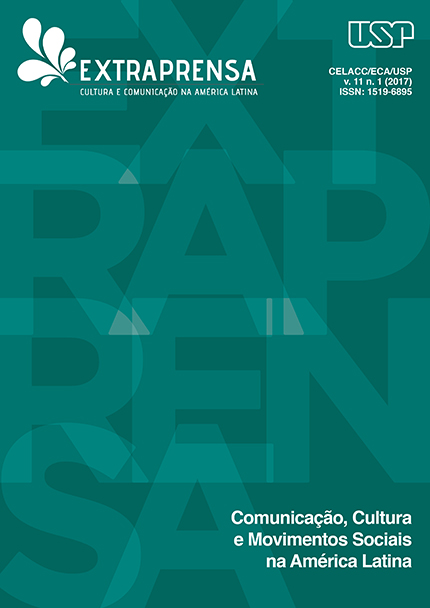The exercise of citizenship of the Greek ágora to the digital social network site
DOI:
https://doi.org/10.11606/extraprensa2017.122629Keywords:
Cyberactivism, Public sphere, Digital social network, Democracy, CitizenshipAbstract
The debate in the digital social networking sites on government decisions refers to the participatory system of Greek democracy and entails the study of the changes undergone in the exercise of citizenship and popular occupation of public space in contemporary cyberdemocracy. The article analyzes the regulatory debate of Brazilian Civil Rights Framework for the Internet made through the site Pensando o Direito, adopting three lines of reflection: the emergence of public cyberspace, a virtualization of the exercise of citizenship and the possibility of increasing the plurality of voices in public debates. At the end, we realize that the Pensando o Direitocan partially consolidate the three lines, but with significant reservations, particularly about low deliberative interaction between users.
Downloads
References
BOBBIO, Norberto. Premissa. In: BOBBIO, Norberto. O futuro da democracia: Uma defesa das regras do jogo. 6. ed. Rio de Janeiro: Paz e Terra, 1997. p. 09-16.
GOMES, Wilson. Participação política online: questões e hipóteses de trabalho. In: CONSELHO EDITORIAL DA COLEÇÃO CIBERCULTURA (Porto Alegre) (Ed.). Internet e participação política no Brasil. Porto Alegre: Editora Salina, 2011. p. 19-46.
GUARINELLO, Norberto Luiz. Cidades-Estado na Antiguidade Clássica. In PINSKY, Jaime; PINSK, Carla B. História da cidadania. São Paulo: Contexto, 2003. p. 29-46
HABERMAS, Jurgen. Mudança estrutural da esfera pública. 2. ed. Rio de Janeiro: Tempo Brasileiro, 2003.
HALL, Stuart. A centralidade da cultura: notas sobre as revoluções culturais de nosso tempo. Educação e Realidade, Porto Alegre, v. 22, nº. 2, jul./dez. 1997. p. 15-46
LEMOS, André. Cibercultura: Alguns pontos para compreender a nossa época. In LEMOS, André; CUNHA, Paulo (orgs). Olhares sobre a Cibercultura. Porto Alegre: Sulina, 2003. p. 11-23. Disponível em: <http://www.facom.ufba.br/ciberpesquisa/andrelemos/cibercultura.pdf>. Acesso em: 16 maio 2016.
LÉVY, Pierre. O que é Virtual. São Paulo: 34, 1996.
________ A inteligência coletiva: por uma antropologia do ciberespaço. 5. ed. São Paulo: Loyola, 2007.
PRIMO, Alex. O que há de social nas mídias sociais? Reflexões a partir da teoria ator-rede. Contemporânea, Salvador, p.618-641, set. 2012.
RECUERO, Raquel. Redes sociais na internet. Porto Alegre: Meridional, 2009.
RODRIGUES, Adriano Duarte. Estratégias de comunicação: questão comunicacional e formas de sociabilidade. Lisboa: Presença, 1997.
ROSTOVTZEFF, Michael Ivanovich. História da Grécia. Rio de Janeiro: Zahar, 1977.
WOLTON, Dominique. “A globalização da informação”. Revista FAMECOS, Porto Alegre, nº. 20, abr. 2003. p. 21-25.
Referências eletrônicas
Comitê gestor da internet. TIC Governo Eletrônico. Disponível em: <http://cetic.br/pesquisa/domicilios/>. Acesso em: 3nov.2016.
Comitê gestor da internet. TIC Domicílios. Disponível em: <http://cetic.br/pesquisa/domicilios/>. Acesso em: 3 nov.2016.
G1. WhatsApp: Justiça do RJ manda bloquear aplicativo em todo o Brasil. Disponível em: <http://g1.globo.com/tecnologia/noticia/2016/07/whatsapp-deve-ser-bloqueado-decide-justica-do-rio.html>. Acesso em: 5 nov. 2016.
IBGE. População do Brasil. Disponível em: <http://www.ibge.gov.br/apps/populacao/projecao/>. Acesso em: 5 nov. 2016.
MIGALHAS. TJ/RS usará WhatsApp para fazer intimações. Disponível em: <http://www.migalhas.com.br/Quentes/17,MI242690,101048-TJRS+usara+WhatsApp+para+fazer+intimacoes>. Acessoem: 12 jun. 2017
O'REILLY, Tim. What Is Web 2.0: Design Patterns and Business Models for the Next Generation of Software.Disponível em: <http://www.oreilly.com/pub/a/web2/archive/what-is-web-20.html?page=1>. Acesso em: 16 mai. 2016.
PENSANDO O DIREITO. Debate sobre o decreto do Marco Civil da internet finaliza com mais de 1.500 comentários.Disponível em: <http://pensando.mj.gov.br/2016/03/03/fim-debate-publico-marco-civil/>. Acesso em: 3 nov. 2016.
Downloads
Published
Issue
Section
License
Ao submeter qualquer material científico para Extraprensa, o autor, doravante criador, aceita licenciar seu trabalho dentro das atribuições do Creative Commons, na qual seu trabalho pode ser acessado e citado por outro autor em um eventual trabalho, porém obriga a manutenção de todos os autores que compõem a obra integral, inclusive aqueles que serviram de base para o primeiro.
Toda obra aqui publicada encontra-se titulada sob as seguintes categorias da Licença Creative Commons (by/nc/nd):
- Atribuição (de todos os autores que compõem a obra);
- Uso não comercial em quaisquer hipóteses;
- Proibição de obras derivadas (o trabalho não poderá ser reescrito por terceiros. Apenas textos originais são considerados);
- Distribuição, exibição e cópia ilimitada por qualquer meio, desde que nenhum custo financeiro seja repassado.
Em nenhuma ocasião a licença de Extraprensa poderá ser revertida para outro padrão, exceto uma nova atualização do sistema Creative Commons (a partir da versão 3.0). Em caso de não concordar com esta política de Direito Autoral, o autor não poderá publicar neste espaço o seu trabalho, sob pena de o mesmo ser removido do conteúdo de Extraprensa.







